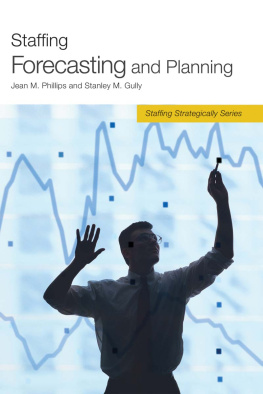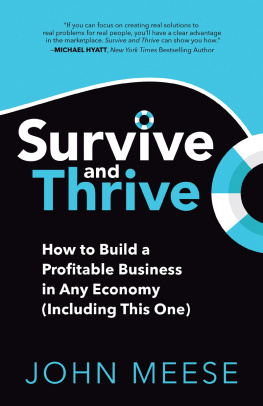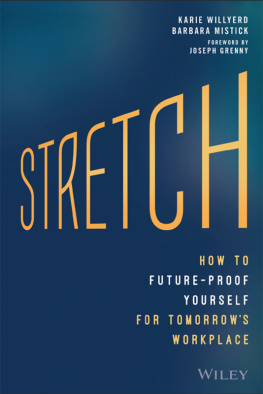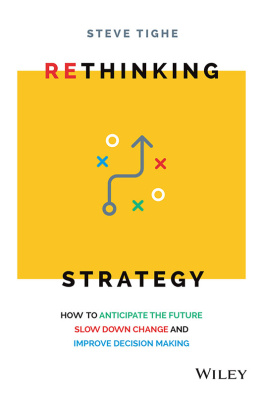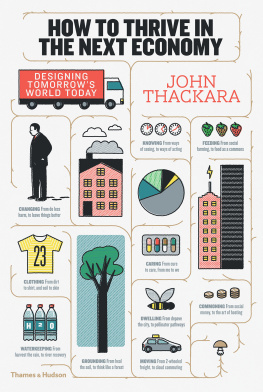Praise for
R ETHINKING THE F UTURE
This assembles an all-star gala: Handy, Covey, Porter, Prahalad, Hamel, Hammer, Senge An excellent introduction to these mens work from their own lips. If you have ever wanted to look into a crystal ball and see the way of the future, this book is the one for you. It brings together the thoughts of some of the most well-known business gurus on the changes that organizations will have to adapt to in the future. The book contains some fascinating insights on rethinking markets, principles and competition. Management Consultancy
Managers will realise that this book is invaluable for the insights it offers in scenario planning or strategic thinking that vital activity which organizations and their leaders must undertake if they wish to understand underlying market trends and be top dog in the future through taking action now. Rethinking the Future tackles this world of increasing uncertainty head-on. Management Skills and Development
Rowan Gibson has demonstrated editorial skills of an exceptionally high quality. The overall balance is good and the various essays are, without exception, informative, challenging, thought provoking and well worthy of perusal. Modern Management
In todays world, where management how to books mushroom everywhere, Rethinking the Future is the best executive summary one could think of. Cor Boonstra, President and Chairman of the Board, Philips
A dazzling collection of leading business gurus summarizing their best thoughts. Future Survey
Original contributions from:
Warren Bennis
Stephen Covey
Eli Goldratt
Gary Hamel
Michael Hammer
Charles Handy
Kevin Kelly
Philip Kotler
John Kotter
John Naisbitt
Michael Porter
CK Prahalad
Al Ries
Peter Senge
Lester Thurow
Jack Trout
Edited by Rowan Gibson
RETHINKING THE FUTURE
Rethinking business, principles,
competition, control & complexity,
leadership, markets and the world

This revised paperback edition first published by
Nicholas Brealey Publishing Limited in 1998
3-5 Spafield St | 20 Park Plaza, Suite 1115A |
London | Boston |
EC1R 4QB, UK | MA 02110, USA |
Tel: +44 (0)20 7239 0360 | Tel: (888) BREALEY |
Fax: +44 (0)20 7239 0370 | Fax: (617) 523 3708 |
www.nicholasbrealey.com
First published in hardback in the UK in 1996
Rowan Gibson 1996, 1997, 1998
The rights of Rowan Gibson to be identified as the author of this work
have been asserted in accordance with the Copyright, Designs and Patents
Act 1988.
ISBN 978-1-85788-108-0
Library of Congress Cataloging-in-Publication Data
Gibson, Rowan.
Rethinking the future : rethinking business, principles, competition, control, leadership, markets and the world / Rowan Gibson.
p. cm.
Includes index.
ISBN 1-85788-103-6 (HB) 1-85788-108-7 (PB)
1. Organizational change. 2. Organizational effectiveness. 3. Strategic planning. 4. Competition. I. Title.
HD58.8.G53 1997
658.4dc20
96-25422
CIP
British Library Cataloguing in Publication Data
A catalogue record for this book is available from the British Library.
All rights reserved. No part of this publication may be reproduced, stored in a retrieval system, or transmitted, in any form or by any means, electronic, mechanical, photocopying, recording and/or otherwise without the prior written permission of the publishers. This book may not be lent, resold, hired out or otherwise disposed of by way of trade in any form, binding or cover other than that in which it is published, without the prior consent of the publishers.
To my wife, Anke
and to all the great minds
who made this book possible
CONTENTS
FOREWORD
N OT SINCE THE dawn of the Industrial Revolution have managers had more to learn (and unlearn) about the art of business leadership. And seldom have they been offered so much diverse and confusing advice. The reason for the current upheaval in management thinking is the arrival on the world scene of a revolutionary new system for creating wealth. Historians can slice the past into countless slivers. But in terms of transformational change, there have been only a few true turning points in history, each associated with the emergence of a different system for wealth creation.
The invention of agriculture provided the human race with a new way to convert the earths resources into wealth, and almost everywhere launched a First Wave of change in civilization that gave rise to peasant-centered economies and eventually supplanted hunting and foraging as the primary means of human subsistence.
Similarly, the Industrial Revolution triggered a Second Wave of change that gave us a factory-based system for wealth creation. In turn, this led to mass production, the drive for larger and larger markets, and the need for bigger, ever more bureaucratic business organizations. Until very recently, most of what was taught in management texts and in schools of business reflected Second Wave thinking.
Based on assumptions of linearity and equilibrium, and heavily quantified, the dominant management paradigm paralleled the mechanistic assumptions of western economics, which, in turn, attempted to parallel Newtonian physics. This multileveled parallelismthe belief that management science fitted perfectly with economic science and that both were compatible with what was known about physicsmade the industrial management paradigm enormously persuasive.
Indeed, all three of these disciplinary layers formed parts of an even larger set of epistemological and philosophical ideas which has elsewhere been described as indust-realityreality as perceived through the eyes of people reared in an industrial culture. In short, the dominant business paradigm of the Second Wave era was part of a much larger architecture of thought.
In 1970, we publicly attacked the prevailing paradigm for the first time in our book Future Shock, and suggested that businesses were going to restructure themselves repeatedly and move beyond bureaucracy; that they would have to reduce hierarchy and take on the character of what we termed ad-hocracy. At the time, all this sounded sensationalist to many readers. We had a similar experience in 1972, when we delivered a consulting report to AT&T, then the worlds largest privately held corporation, saying that it would have to break itself up. For years, that report was literally kept hidden from the very managers who needed to prepare the firm for the break-up which, in fact, came 12 years laterthe biggest and most excruciating corporate breakup in history. And when in 1980, in our book The Third Wave, we coined the term de-massification to describe the coming move beyond mass production, mass distribution, mass media and socioeconomic homogeneity, we again were thought by some to be too visionary.
We suspect that many of the contributors to this volume have faced comparable skepticism. The reason is simple: anyone who attacks a dominant paradigm too early can expect to be regarded with suspicion by the reigning intellectual and academic establishment. But paradigmsincluding management paradigmsare not permanent. And the industrial era management model, especially in the US, is now blowing its bolts and rivets.
Next page

